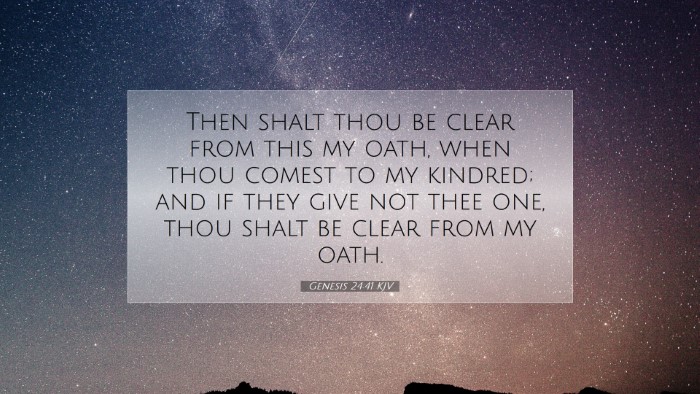Commentary on Genesis 24:41
Genesis 24:41 reads: "Then will I be clear from my oath this day, when I come to my kindred; and if they give not thee one, thou shalt be clear from my oath." This verse is a part of the narrative where Abraham's servant is tasked with finding a wife for Isaac.
Contextual Overview
The broader context of Genesis 24 revolves around the importance of lineage and the covenant promises God made to Abraham. The servant, entrusted with this significant task, is keenly aware of the responsibilities that lay before him. This task is not just about finding a suitable wife but ensuring that the chosen woman would be part of God’s covenant people.
Commentary Insights
1. The Servant's Oath
Matthew Henry points out that the servant's adherence to the oath signifies his commitment to fulfilling Abraham's directive. This act of swearing an oath reflects the gravity of his mission and the necessity of divine guidance. The servant sets a condition for his oath; this indicates the seriousness with which he views his responsibilities.
2. The Role of Divine Providence
Albert Barnes emphasizes the role of Divine Providence throughout the servant’s journey. The servant's commitment to ensure that Isaac does not marry a Canaanite woman illustrates the need for divine intervention in securing a spouse from the right lineage: "And it shall come to pass, that the right woman will reveal herself through her deeds." This aspect underlines the importance of seeking God's will in significant life choices.
3. The Nature of Commitment
Adam Clarke draws attention to the nature of commitment expressed in this verse. The servant’s declaration that he would be "clear from his oath" serves to highlight the conditions under which he undertakes this important mission. If his family does not consent, he relinquishes himself from the oath, thereby recognizing both human free will and divine sovereignty.
4. The Significance of Family Consent
The requirement for consent from Abraham's kindred demonstrates the communal aspect of marriage in ancient times. As Henry elaborates, the household plays a pivotal role in binding potentially familial relationships. The importance of this union is not solely on individual choice but also on familial harmony and agreement.
5. The Nature of Faith
This passage illustrates a profound aspect of faithfulness. There is an underlying recognition by the servant that faith does not necessitate blind trust but requires a discerning spirit. Barnes posits that the servant’s approach—asking for a sign—exemplifies a robust understanding of faith. Asking God for guidance and clarity in complicating matters is a testament to one’s reliance on divine direction.
Theological Implications
Genesis 24:41 provides rich theological insights that resonate deeply with modern readers:
- Divine Guidance: The importance of seeking God's direction in decisions is paramount. Just as the servant sought clarity, so should we in our lives.
- Community Influence: The communal aspect of decision-making reflected in the family’s consent serves to remind us of the interconnectedness we have with our communities, especially in pivotal life moments.
- Covenantal Faithfulness: The quest for a spouse within the boundaries of covenantal faithfulness speaks to the broader call for believers to maintain purity and holiness in their relationships.
Practical Applications for Today
As pastors, students, and theologians grapple with the implications of this passage, several applications arise:
- Seek Divine Will: Encourage prayerful discernment in making major life decisions, adhering to the example set by Abraham's servant.
- Teach about Marriage: Highlight the sanctity of marriage and the importance of engaging family and community in the process.
- Discuss Covenant Relationships: Reflect on the nature of relationships in light of the covenant, guiding individuals towards meaningful and God-honoring partnerships.


